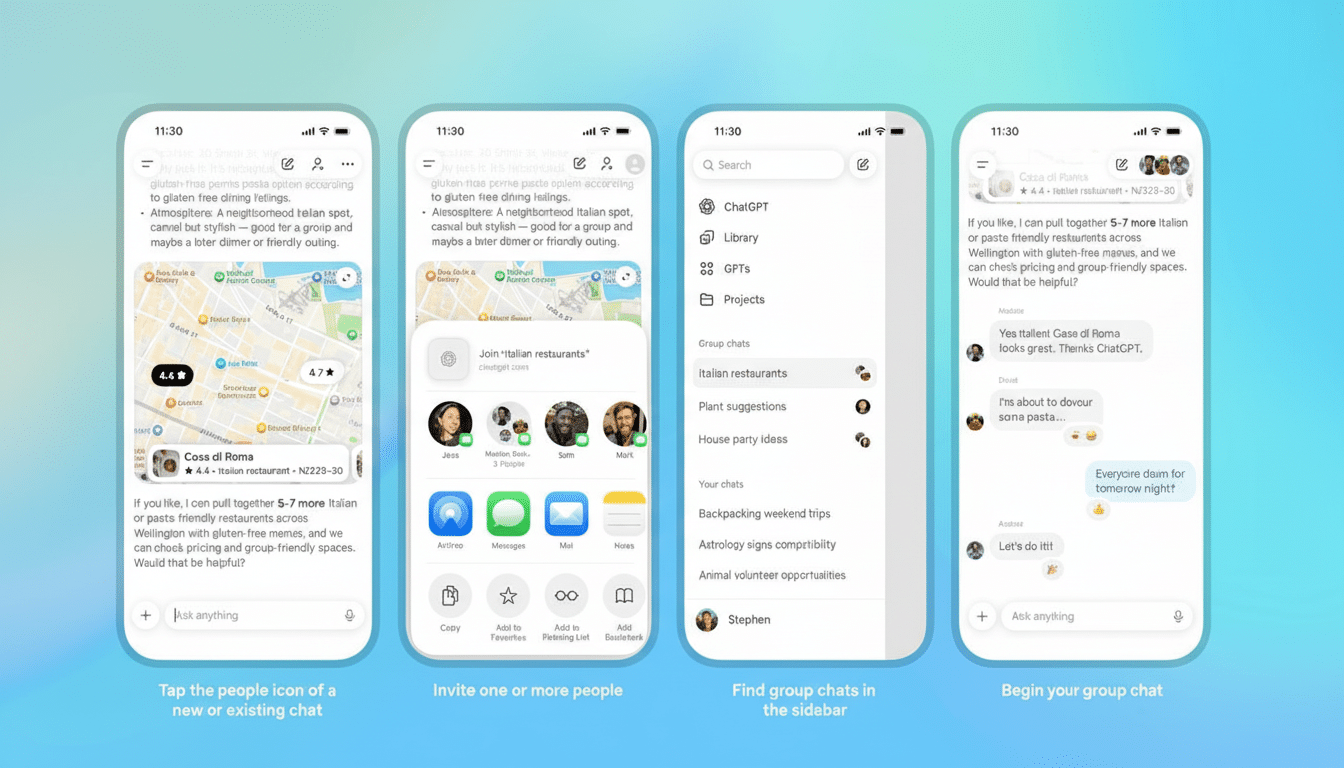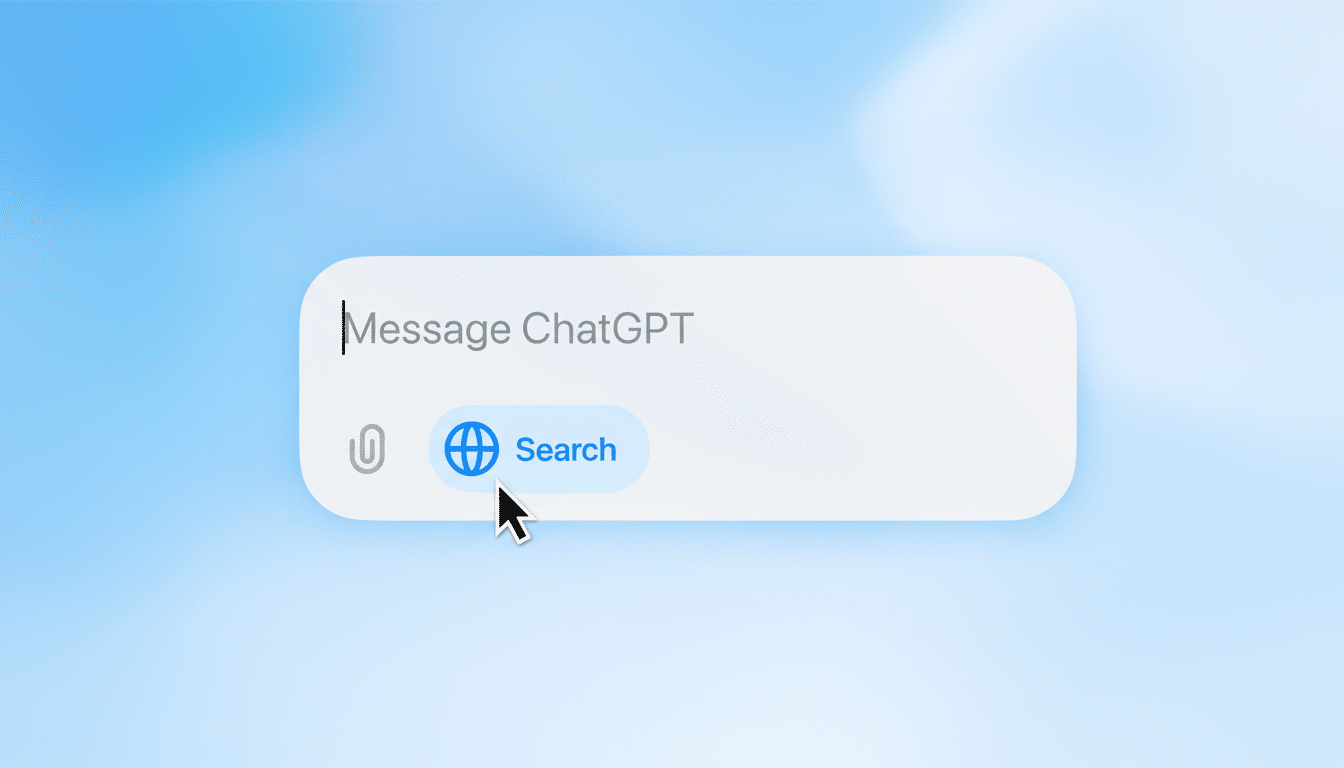OpenAI has quietly started testing group chats within the ChatGPT app, and the initial design choice that leaps out is pure chaos by design: invite links are open to resharing until a 20-person limit is reached. It’s a daring experiment to mingle human conversation with an AI collaborator in the same thread and invite people to go from there, positioning ChatGPT as something of a utility for planning, brainstorming or doing (very quick) research — right where people already organize their lives.
How ChatGPT group chats work with invite links
Users can spin up a group right from an existing ChatGPT convo or start anew. There’ll be a new people icon in the top right, which lets you create an invite link to share. Whoever has the link can forward it, and everyone on that chain is in — up to 20 people. The creator can name the group, mute notifications and remove members, but because the link is open, for now it’s more like handing out a lobby key — convenient centralizing, but not private by default.

Once people join a first group, they set a display name, username and photo one time — that identity follows them across future group chats. The new section of the sidebar is called “Group chats,” which appears above the personal threads but below recent posts, displaying small profile photo previews that visually help you scan who’s inside each discussion.
What the AI can learn in a crowd setting
OpenAI says the system is powered by GPT 5.1 Auto, which can automatically shift between models depending on the task at hand. In practice, that means all of the familiar ChatGPT tricks carry over into chatty groups — web search, image and file uploads, image generation and voice dictation. The model is trained to use “social” behaviors so that it does not intervene after every sentence — talking when necessary, being silent when needed.
Some nice, human touches: ChatGPT can respond with emojis and allude to members’ profile photos if encouraged to generate personal digital images, such as a party flyer or mock team logo. In planning scenarios — packing lists, route options, splitting the budget — the AI can bring up structured recommendations for discussion as a group haggles over specifics.
Privacy and safety considerations for group chats
OpenAI explains that personal “memory” characteristics are deactivated in group chat and its group chats don’t contribute to your AI memory. It’s a reasonable default when there are multiple identities at stake. And yet the invitation system, based on links, invites familiar risks. Publicly shared links on platforms like Slack, Telegram and Zoom have historically spilled into search results or forums; they also sometimes invited uninvited meeting attendees. The 20-person limit is a cap on exposure, but admins will need to pay attention to membership counts and potentially regenerate links if they get pushed too far.
Basic admin tools available at launch today include removing people, muting notifications and naming the room. Things to keep an eye out for on a practical level are expiring links, domain restrictions based on workplace, tiered roles (owner, moderator) and activity logs. That’s table stakes in enterprise chat, and will mean something if the feature transitions from pilot to a productivity mainstay.

Where it’s available and who is getting it
The pilot will be available to signed-in users on Free, Go, Plus and Pro plans in Japan, New Zealand, South Korea and Taiwan. OpenAI is framing this so-called learning phase, and more expansive areas are likely after it digests early feedback and stress-tests moderation and usability at scale.
Why this move matters for messaging and planning
AI is being hurled into the places where people already pass time. Meta is integrating AI assistants into WhatsApp and Messenger; Google is rolling out Gemini across Messages and Workspace. Group planning is the lifeblood of messaging — literally everything from class projects and club boards to family vacations — so baking in an AI that fetches information, writes copy and designs graphics without ever leaving the thread attacks actual friction.
The market context is telling. Messaging apps connect billions of people each month — WhatsApp alone has more than 2 billion users globally, according to industry watchers. Reports from organizations such as Pew and DataReportal have long documented that these group chats are central to organizing social events, school activities and the community at large. If its group presence is genuinely helpful — and not obtrusive — it could wind up serving as the default “extra brain” in those chats where decisions are made in real time.
Early verdict and what to watch as testing expands
Open, reshared links mean that onboarding is automatic and a bit messy — which is the point of the test. The criteria for success are simple: Does ChatGPT chime in at the right times, save time during preparation and not talk over people? Anticipate swift iteration around admin controls, link management, and expansion by region as OpenAI measures real-world behavior.
For now, the pitch is straightforward and compelling: keep your friends, your files and your AI in one place, and arrive at decisions sooner. If OpenAI gets the social gamesmanship right, group chats may end up being ChatGPT’s most addictive feature yet.

